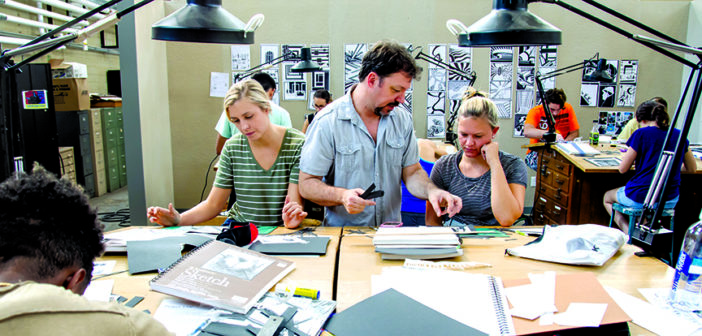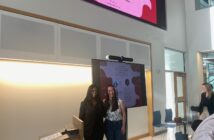In the face of the coronavirus, art students have been left wondering how they would continue their courses, without expensive Adobe software and access to their studios that exist on campus.
Jason Travers is the professor of 2D Design, a prerequisite studio class on Mountaintop Campus for many art, design, art history and architecture majors.
Travers, realizing the uncertainty of this period, said he has found ways to work through each student’s individual obstacles, while finding creative solutions to keep the class moving forward.
“It’s been a learning curve for everyone,” Travers said. “I think first and foremost, it was really important to give students the assurance that their well-being was top priority.”
2D Design is taught as a hands-on class, including topics like compositional theory, painting and graphic design. At this point of the semester, Travers moves the course from physical artwork to using an online platform, teaching Adobe Illustrator and Photoshop in computer labs.
Travers said he can usually walk over to a student’s desk and help them while lecturing, so he thought pre-recorded lectures to demonstrate the technology would be best, so students could pause and comprehend on their own time.
Working in the Digital Media Studio in FML, Travers said he spent the three days before the university closed pre-recording as many lectures as possible. This was helpful for him before he returned home to the squeaky chairs in his home office, he said.
Travers said the first week of online classes had some drawbacks, including making sure that everyone had access to a computer, the internet and the Adobe platforms they work with.
Erica Kagan, ’22, one of Travers’ students, said she was worried about the transition initially.
“I think (Travers) is trying to be as understanding as possible,” Kagan said. “I was honestly worried about it and thought there was no way this class is going to work remotely, but he’s figured it out.”
Travers said he instructed students to use the seven-day free trial on the software while the university hurried to figure out the licensing with Adobe. Adobe ultimately extended licensing agreements to all students at universities which pay for the software, granting Lehigh students full access to Adobe tools until May 31.
After getting licensing for Adobe, the university also provided emergency funding for students who didn’t have the appropriate hardware for the course.
Kagan said she has noticed that despite the obstacles the class has had to face, the students unified and helped each other solve technical issues.
“Some people in my class made a GroupMe for everyone in it after spring break because they were overwhelmed at first,” Kagan said. “People actually came together more despite everything.”
Dani Slepak, ’22, another student in Travers’ class, said she agrees that having extended deadlines were helpful while the Adobe licensing was being figured out, but wishes she could have more human interaction from the online classroom.
Travers said he hopes to do live critiques through Zoom, allowing students to talk about their work to other students and see what everyone else is doing, but feels that the enthusiasm of the classroom becomes lost through the camera.
“I’d appreciate having more access to my professor — even Zoom sessions would be helpful,” Slepak said. “At least have 15-minute zoom sessions like once a week just to get some conversation with him.”
In the meantime, he has a WordPress blog where for the first time, the students can see everyone else’s work, including students in other classes. He said he sees this and the pre-recorded lectures as the silver lining, and plans to continue to record lectures for students and have the blog available when things return back to normal.






Comment policy
Comments posted to The Brown and White website are reviewed by a moderator before being approved. Incendiary speech or harassing language, including comments targeted at individuals, may be deemed unacceptable and not published. Spam and other soliciting will also be declined.
The Brown and White also reserves the right to not publish entirely anonymous comments.